
With "This Extraordinary Being," the sixth episode of its first and possibly only season, Watchmen just delivered what is being hailed as an all-timer. It's not just the show's best episode, not just the best episode of any TV show this year, not just one of the best episodes of the decade - no, this was "one of the best episodes of TV ever."
All hyperbole aside, the episode was something truly extraordinary, but in my mind, it serves as further confirmation that the comic book genre - or at least comic book TV - is entering into a new Peckinpah era.
What's a Peckinpah era?
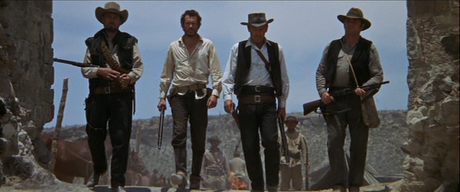
When the western was waning culturally and running out of creative gas, director Sam Peckinpah and The Wild Bunch came along to revise everything we thought we knew about the genre and give it new life, ushering in a revisionist era characterized by new extremes and introspection. You see this same trajectory plays out in any number of different genres throughout film history, but Peckinpah's take on the western has always stood out as one of the premier examples of what can happen to something that's starting to look a little long-in-the-tooth.
Based on ratings, box office returns, and critical reviews, you could hardly say the comic book genre is in a similar position of needing to be saved. It's really more like there are now many so many comic book properties on TV and in theaters that it's incumbent on the creators to try new things if they want to stand out.
The Boys and Doom Patrol blow things up
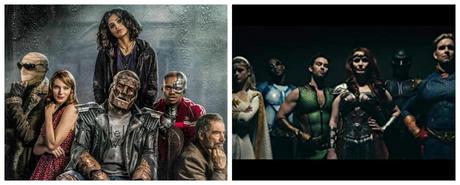
So, The Boys, on Amazon Prime earlier this year, goes to surprising extremes. The Eric Kripke-produced series features a corporatized Superman with sociopathic/voyeuristic tendencies and a Justice League torn apart by a #MeToo scandal. The sex and violence are front and center. Season 2 is filming right now. Titans made its name on Robin denouncing his mentor with a perfect teen rebellion line like "fuck Batman." The series is currently in its second season with a third due next year. DC Universe's Doom Patrol explores anti-heroes and a shadow version of the X-Men where Professor Xavier is kind of the bad guy. Plus, it literally wraps its closeted gay hero character in Invisible Man bandages.
You could counter-argue that the Marvel Netflix shows were the real start of the turn toward more mature material, but those shows are all gone now and their direct challenge to the rest of superhero TV to up its game has taken a while to kick in across the board. Still, those shows are obvious half-steps to where we are now.
Watchmen gives us the Greatest American Hero
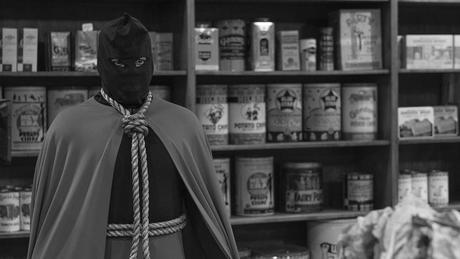
Watchmen is the true deconstructionist in the group. Through this series, Damon Lindelof is stripping the American superhero mythology down to its core and exploring the rot at the center of our national identity, namely that we still haven't and possibly can't move on from our racist beginnings. In "This Extraordinary Being," even the world's first superheroes are too racist to handle a black hero and too preoccupied with their own troubles to care about their colleague's ongoing fight with the KKK.
The plot of the episode: After overdosing on a psychotropic drug called Nostalgia, series lead Angela Abar (Regina King) floats through her grandfather Will Reeves' (played in the present by Louis Gosset, Jr., but here in the flashbacks by Jovan Adepo) memories of being a police officer in 1930s/40s New York. He escaped the "Black Wall Street" massacre as a child (more on that later) and naively thinks New York will be different. (Sometimes Angela pictures herself as Will; other times she's passively observing from a distance.)
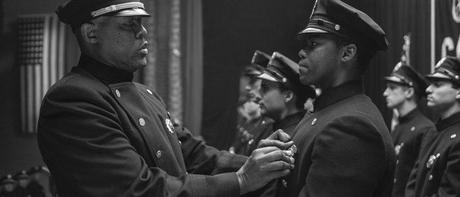
Over many years, Will evolves into becoming a masked crime fighter after his attempts to battle the KKK through more legal means end up thwarted by widespread corruption. However, he's wearing more just one mask. Through his wife's suggestion, he paints the portion of his face you can see through the mask to make him look like a white person since no one could accept a black face on their hero, and beyond all of that he is a closeted homosexual.
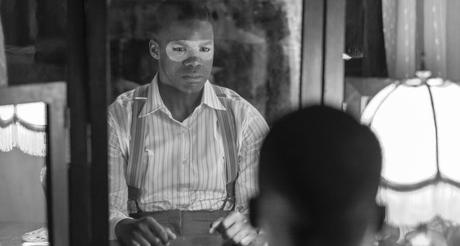
The episode is presented, predominantly, in black and white, and is arguably the most comic booky hour yet for this version of Watchmen. It plays with the familiar arc of a superhero origin story by bending it around American history, giving us a black hero pitted against the KKK and occasionally rubbing shoulders with real historical figures such as the NYPD's first black officer. It's no mistake that Will ends up calling himself Hooded Justice and wearing a noose around his neck, a direct rebuke to KKK iconography and constant reminder of the time he was almost lynched.
Retconning Alan Moore for the better
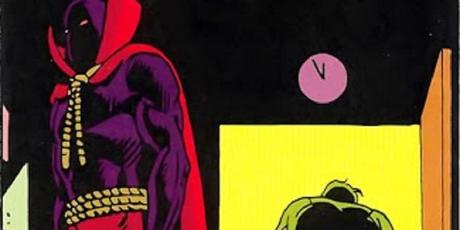
Of course, in Alan Moore's iconic graphic novel, there is a figure called Hooded Justice, but we end the story knowing little about him other than his closeted homosexuality. He's just one of the founding members of the Minutemen, Moore's version of the Justice Society of America. Hooded Justice never removes his mask and none of the other members know his identity.
Damon Lindelof knows this. He's frequently described Moore's Watchmen as a formative text to his development as a storyteller, and when the opportunity arose for him to head a sequel series for HBO one of his first proposals was to make Hooded Justice a black man. This is largely because Lindelof's chief creative instinct with this Watchmen is to locate the existential malaise of our current historical moment. In that way, he's taking his cue from the source material.
From worrying about the Cold War to ruminating on racism
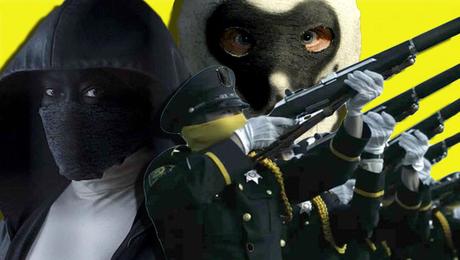
When Moore and Dave Gibbons created the graphic novel in the 1980s, they gravitated toward the Cold War as the center of their narrative gravity; in 2019, Lindelof has zeroed in on race and trauma. The latter is hardly a surprise given what he did with his last TV show, The Leftovers, and any true sequel to Watchmen would inevitably have to deal with the generational trauma visited upon a country in which millions died instantly after a psychic squid fell out of the sky onto New York City. Watchmen 's fifth episode, "Little Fear of Lightning" chronicled this beautifully through an origin story for Looking Glass, Tim Blake Nelson's laconic detective.
From the opening scene of the pilot, however - a harrowing depiction of the 1921 race riot in which the KKK decimated Tulsa, Oklahoma's "Black Wall Street" - this Watchmen has made race its central driving force. This, at least in part, accounts for some of the fan pushback, with many dismissing Lindelof and Co.'s work as just the latest eye roll-inducing example of Hollywood's sudden need to make everything woke.
The case(s) against Damon Lindelof's Watchmen
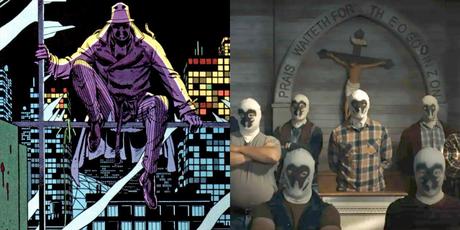
Other arguments - some I get, others I don't - piling up against this Watchmen: Alan Moore didn't give his permission for this show to exist, Damon Lindelof's puzzle box style simply isn't for everyone nor his signature sideways approach to IP, if you haven't read the graphic novel you're not going to get nearly as much out of this, why is a white guy like Lindelof the one who gets us to tell us about racism, the show's depiction of the police force is "problematic," how dare they put Rorshach's mask on a group of white supremacists!
A work of white guilt
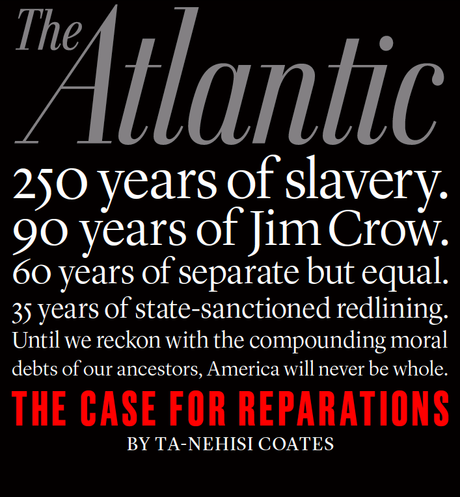
Lindelof, by his own admission, came to this point out of white guilt. According to HBO's official Watchmen podcast, this all started a couple of years ago when Lindelof read Ta-Nehisi Coates Atlantic article "The Case for Reparations" in which the author details the 1921 KKK massacre of "Black Wall Street" and the country's long-running history of racism. Coates rather persuasively put an end to any pollyannish notion that Obama's presidency meant the end of racism in Ameria.
Lindelof was stunned. Not that Obama didn't end racism. Anyone could figure that out. No, he was stunned because the destruction of "Black Wall Street" felt like a major, American historical atrocity, and this was the first time he had ever heard about it. As he asked around in his social circle, his white friends were similarly dumbfounded while his black friends could only shake their heads. Of course they already knew about it!
This disconnect struck Lindelof as emblematic of our larger societal issues, and several years - and several conversations with Ta-Nehisi Coates - later he is using Watchmen to explore this and reassess the role superheroes play in our larger mythology. That's how we've ended up with a thought experiment version of Watchmen in which the U.S. government under President Robert Redford (it's complicated) has offered reparations for the "Black Wall Street" massacre.
What would happen, Lindelof and his writers' room wondered, to an American city in the Midwest if the government suddenly gave seed funding to a bunch of African-Americans to start businesses, buy homes and land, and take back that which was robbed from their ancestors? The show's answer is that a white supremacist group would inevitably rise up to fight back, presented here as the Seventh Cavalry, a group of white Okies donning Rorschach's mask instead of Klan hoods.
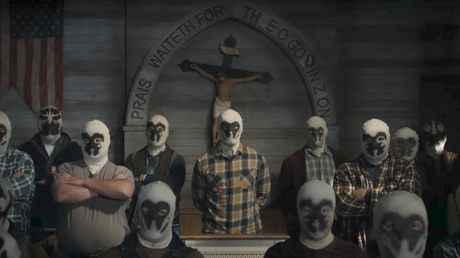
How this resolves, we have no idea. But, in a rather surprising twist, we recently learned the Seventh Cavalry subscribes to a conspiracy theory which is actually true. They believe the psychic squid which ended the Cold War and brought about temporary world peace was a false flag operation, and they're right. Anyone who knows the graphic novel knows the squid was created by Adrian Veit, but very few of Watchmen 's characters are clued into that. Most of those that also just happen to be racists. They also believe Robert Redford is some leftist stooge puppet, and they're right.
So, what would you do if the conspiracy theorists were awful people but also kind of right? And are secretly led by a man, Senator Keene, with a fast track to the presidency?
Will Reeves as Superman
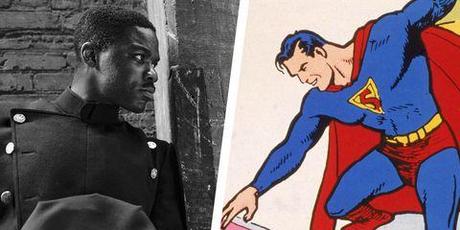
The Seventh Calvary isn't in "This Extraordinary Being," but their message of hate is certainly represented by Cyclops, which is presented as an underground branch of the KKK operating in plain sight without masks and coordinating to undercut blacks everywhere. Will Reeves seems to be the only one willing to investigate. His superhero pals talk about courting corporate sponsorship and putting a fist to the face of vaguely fantastical sci-fi baddies with silly names; Will has to stop a series of KKK-induced race riots. With that kind of divide, what use do we have of the more traditional heroes when all they do is distract us from the real problems?
It is, of course, no accident that in "Extraordinary Being" Will briefly reads the first Action Comics issue and hears all about Superman's iconic origin story, ya know, the one that was created by two Jewish immigrant teenagers writing in the shadow of WWII. Here, that origin story is repurposed for Will - exiled from his homeland (Tulsa, Oklahoma), forever torn between conflicting identities (police officer by day, masked crimefighter by now; father and husband at home, gay man with a lover on the side).
With all due respect to Idris Elba, Will Reeves - an optimistic child, naive young police officer, angry crime fighter, and deeply bitter old man - is the clear "black Superman," and Watchmen appears to be the critical favorite for most important comic book cinema of the moment. After an episode like "This Extraordinary Being," it's hard to argue. I just wonder what happens next in this Peckinpah era.
What's your take on Watchmen? "This Extraordinary Being"? The Boys? This new Peckinpah era of comic book TV? Let me know in the comments.

